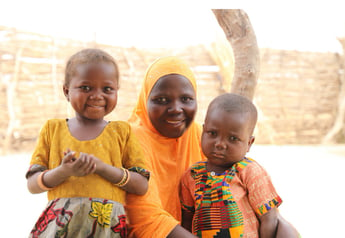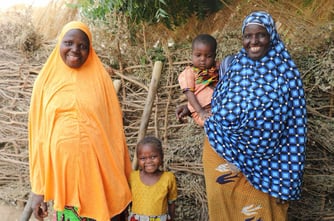 Asmaou and her children (©2021 World Vision/photo by Tabita Soumaila Asmaou and her children (©2021 World Vision/photo by Tabita Soumaila |
It’s often said that being a mother is the hardest job in the world. But when you live in one of the world’s poorest countries, the hardest job is even harder.
Asmaou’s story
Asmaou’s smile hides her fear. Pregnant with her third child, Asmaou is also malnourished — and afraid of what it will mean for her baby. She and her family live in Niger, ranked 189th out of 189 countries listed on the UN Human Development Index. That’s dead last.
Asmaou’s husband is a farmer, but they can barely make ends meet. Sometimes they can live off what he grows, but often it’s simply not enough. Night after night, Asmaou and her children go to bed hungry. The children are frequently sick because of their weakened immune systems and the contaminated water in their village. The closest health center is almost four miles away. But even if she makes it there to give birth, there is no running water, no anesthesia, no pain killers, and no possibility for a C-section. Instead of being a safe place to deliver, dilapidated, unsanitary clinics like this pose a threat to mothers and newborns.
This video, filmed in January 2021 by World Vision staff, shows the conditions of a health clinic in Niger that serves nearly 34,000 people from 42 villages.
The tragic reality is that in Niger, one out of every 12 children do not make it to their fifth birthday. Thousands of women like Asmaou do not have access to healthcare, nutrition, and medicine. Malnourished themselves, they give birth to malnourished children, continuing the cycle of hunger, illness, and death.
"It’s difficult for me to imagine carrying children and delivering them in the environment that many mothers in other parts of the world do.”
—Courtney Howard, World Vision donor who supports the Mother and Child Health Fund
Change is on the horizon
The need is daunting in Niger, but change is on the horizon. World Vision began working in the Dosso and Maradi regions of the country in January 2021, focusing on pregnant mothers and the first 1,000 days of children’s lives in three critical ways: prevention, treatment, and clinic upgrades. This $10 million project aims to reach more than 167,000 women and children under 5 across three districts. Together we can help make good health and hope possible for mothers and children — but we can’t do it without your support.
Join us in empowering women with the vital knowledge and support they need to keep themselves and their children safe from malnutrition, disease, and sickness. Your partnership will help equip and train local community health workers to quickly diagnose and treat cases of malaria, pneumonia, and diarrhea in homes, so the chances of survival are greater. Your support will help ensure that rural clinics have the equipment, medicine, and clean water they need to have a better chance of successfully treating their patients. Together we can help lay the foundation for better futures where children flourish and communities thrive.
|
Asmaou and older her sister with Asmaou’s children. (©2021 World Vision) |
Invest in mothers to bring lasting change
World Vision is committed to helping mothers like Asmaou overcome malnutrition in their children and give birth to healthy babies. Our work isn’t limited to Niger — with support from our faithful donors, we’re investing in women around the world, empowering them to become self-advocates for lasting change. Because when mothers are equipped with the information and resources they need, they ensure their children are well nourished, protected from disease, and have the opportunity to grow up healthy and strong. And that’s an investment that yields returns long into the future.









